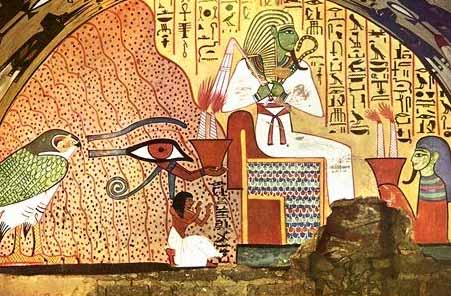
In the chapter "the Advocate", Melville writes:
I freely assert, that the cosmopolite philosopher cannot, for his life, point out one single peaceful influence, which within the last sixty years has operated more potentially upon the whole broad world, taken in one aggregate, than the high and mighty business of whaling. One way and another, it has begotten events so remarkable in themselves, and so continuously momentous in their sequential issues, that whaling may well be regarded as that Egyptian mother, who bore offspring themselves pregnant from her womb. It would be a hopeless, endless task to catalogue all these things.
The reference to the "Egyptian mother" is a reference to the myth of Isis and Osiris. Osiris, Isis' twin brother, impregnantes her in the womb of their mother, Nut. This is not the last mention or reference to Egypt or Egyptians. In just a few pages, Starbucks will be described as having the strength of a "revivified Egyptian"; later, Ahab will be described as having an "Egyptian chest", and a whale head will be described in a chapter called "The Sphinx".
Bruce Franklin, in The Wake of the Gods, argued that the "central myth" around which Moby-Dick was constructed was the myth of Osiris, a myth that was chosen in part for it's "unfathomable antiquity", prior to the Hebrew scriptures and to all the known scriptures of the Mediteranean world. For Franklin, Egypt is the "birthplace of the Gods" and Melville's use of Egyptian themes and images is intended to root the book in the most primordial of all worlds.
Here is Franklin's summary of the core of Osiris myth that Melville used, involving Osiris' battles with Typhon (as opposed to the Isis story or some other myths involving Osiris) which he notes is drawn from several somewhat divergent strands in Plutarch and in Thomas Maurice's Indian Antiquities:
Osiris is a priest-king-god who sails the world in a ship that later becomes the consellation Argo. He hunts Typhon, who is usually represented by some kind of aquatic monster and who symbolizes the ocean and all in nature that is malignant to man. Once a year, Typhon dismembers Osiris. When this happens -- the date is variously given as the autumnal equinox, the winter solstice, and the period in between -- Osiris disappears for a certain length of time, which is also variously given. During this absence from earth, he rules the infernal regions and a ship sails the world bearing his coffin. During this time, also, his phallus is missing and the land lies infertile. In a vernal phallic ritual, Osiris is healed and the fertility of the land is restored. His dismemberment in the fall or winter symbolizes the seasonal disaster in nature. The seasonal ressurection of the sun causes, symbolizes, or is symbolized by his resurrection.
I will not try to provide you with all the many details, analyses or wonderful turns of phrases offered by Franklin; there are some deep and convincing discussions (the comparison of Ahab's dismemberment and recession to Osiris), some "Oh My God!" revelations (Osiris' symbols were the hawk, the coffin and the phallus!), and highly questionable assumptions (as discussed in an earlier post, that humorous discussions of myths should be discounted in importance), all melded together with a close reading of Melville's own words. Franklin approaches the book with a fascinating methodology, steeping himself, over an extended time, in the comparative mythology of Melville's own time, giving short shrift to the more modern, and trying to resurrect himself as something of a 19th century comparative mythologist.
For us, armed with Franklin's description of the myth, here at the first mention of Egypt, it is time to start looking for the small bits of Egyptian bird seed sprinkled about the book and seeing where they lead. My own view is that the Osiris myth is "A" very important part of this world Melville has created, but by no means "THE" central mythology. There's more afoot! But I want to inject Osiris into the discussion now, so we can visit the myth again in the coming pages, and see what we find.
Oh, and do note closely, that while Osiris is undergoing the death phase of his cycle of death and resurrection, he rules over the underworld.
No comments:
Post a Comment